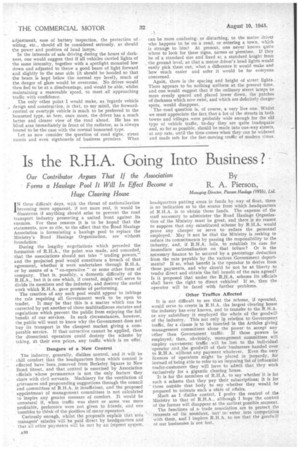Is the R.H.A. Going Into Business? • Our Contributor Argues
Page 32

If you've noticed an error in this article please click here to report it so we can fix it.
That If the Association By Forms a Haulage Pool It Will In Effect Become a R. A. Pierson, Huge Clearing House Managing Director, Pierson Haulage (1933), Ltd.
IN these difficult days, with the threat of nationalization becoming more apparent, if not more real, it would be disastrous if anything should arise to prevent the road transport industry presenting a united front against its enemies. For these reasons it is to be hoped that the statements, now so rife, to the effect that the Road Haulage Association is formulating a haulage pool to replace the Ministry's Road Haulage Organization, are without foundation.
During the lengthy negotiations which preceded the formation of R.H.A., the point was made, and conceded, that the associations should not take " trading powers," and the projected pool would constitute a breach of that agreement, whether it were undertaken through R.H.A. or by means of -a " co-operative " or some other form of company. That is, possibly, a domestic difficulty of the R.H.A., but it is one which, if created, might well serve to divide its members and the industry, and destroy the useful work which R.H.A. gave promise of performing.
The creation of any such pool would appear to infringe the rule requiring all Government work to be open to
tender. It may be that this is a matter which can be corrected by yet another of those multitudinous statutes and regulations which prevent the public from enjoying the full benefit of our services. In such circumstances, however, the public will want to know why the Government does not buy its transport in the cheapest market giving a comparable service. If that corrective cannot be applied, then the dissentient operators could destroy the scherne by taking, a their own pric,es, any traffic which is on offer.
Dangers of a New Control The industry, generally, dislikes control, and it will be chill comfort that the headquarters from which control is effected have been removed from Berkeley Square to New Bond Street, and that control is exercised by Association officials whose permanence is not the only feature they share with civil servants. Machinery for the ventilation of grievances and propounding suggestions through the council and committees of R.H.A. is insufficient, and the proposed appointment of management committees is not calculated to inspire any greater measure of comfort. It would be unnatural if, when traffic was short or some was more profitable, preference were not given to friends, and one trembles to think of the position of many operators Curiously enough, whilst the proposals explain that area managers' salaries will be paid direct by headquarters arid that all other payrrieriti selll be met by an imprest syetem, ASO headquarters putting areas in funds by way of float, there is no indication as to the source from which headquarters of R.H.A. is to obtain those funds. The expense of the staff necessary to administer the Road Haulage Organization of the Ministry must be great, and there is ilia reason to suppese that any substituted scheme by R.H.A. would prove any cheaper or serve to reduce the personnel employed: May it not be that the Ministry is seeking to reduce its commitments by passing the responsibility to the industry, and, if R.H.A, fails, to establish its case for immediate nationalization on that failure? Or is the necessary finance to be secured by a percentage deduction from the rate payable by the various Government departments? If so, what benefit is the operator to derive from those payments, and why should he not be at liberty to tender direct and obtain the full benefit of the rate agreed? Is it proposed that under the R.B.A. scheme its officials shall have the right to direct vehicles? If so, then the operator will be faced with further problems.
Other Traffics Affected It is not difficult to see that the scheme, if operated, would serve to create in R.H.A. the largest clearing house the industry has ever known, and to transfer to the R.H.A. or any subsidiary it employed the whole of the goodwill of the industry. This not only in relation to Government traffic, for a clause is to be inserted in the Articles giving management committees alone the power to accept any other than Government traffic. If those powers be employed, then, obviously, management committees will employ canvassers; traffic will be lost to the individual operator and the goodwill of their businesses handed over to R.H.A. without any payment whatever. Even the very licences of operators might be placed in jeopardy, for instead of being able to refer to an imposing list of influential trader-customers they will have 'to admit that they work exclusively for a gigantic clearing house. It is for the members of R.H.A. to say whether it is for such a scheme that they pay their subscriptions; it is for those outside that body to say whether they would be prepared to tolerate such a state of affairs. Much as I dislike control, I prefer the control of the Ministry to that of R.H.A., although I hope the control of the former will disappear at the earliest possible moment.
The functions of atrade sassociation are to protect the interests -of its members, not' to enter into competition with them, and I implore R.H.A. to s.ee that the goodwill
of our businesses is not lost. •




















































